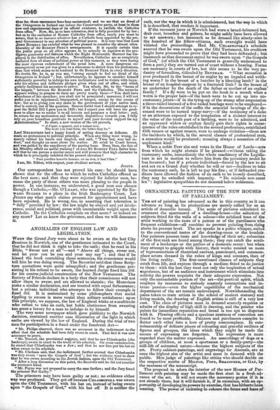ANOMALIES OF ENGLISH LAW AND LEGISLATION.
WHEN the Grand Jury were about to be sworn at the last City Sessions in Norwich, one of the gentlemen intimated to the Court, that he did not think it right to take the oath ; that he read in his Bible, "Swear not at all "—and "Above all things, swear not, and let your yea be yea and your nay nay "; and that if he kissed the book containing those sentences, his conscience would tell him he was doing wrong. The Recorder said that these Scrip- ture quotations were quite misapplied ; and the gentleman per- sisting in his refusal to be sworn, the learned Judge fined him 501. for his contra-judicial construction of the New Testament. The Society of Friends declare in a body that their consciences will not allow them to swear, and are allowed to abstain ; the Moravians make a similar declaration, and are treated with equal forbearance; but a private individual who attempts to follow their example is fined 50/. It is maintained by some philosophers that social tippling to excess is more venial than solitary sottishness : upon this principle, we suppose, the law of England winks at a multitude who refuse to take an oath, but holds abstinence from smearing too great a luxury for a man to indulge in by himself.
The very same newspaper which gave publicity to the Norwich decision, contained another case illustrative of the light in which oaths are viewed by the law of England. During the trial of two men for participation in a fraud under the Insolvent Act-
" Mr. Philips observed, there was an averment in the indictment to the effect that the schedule had been duly sworn in court. That fact it was now necessary to prove.
"Mr. Pennell, the provisional assignee, said that he saw Chlashopska (the bankrupt) sworn in court to the truth of his schedule. On cross-examination, he stated that Chlashopska was a Jew ; and that he saw him put his hat on when sworn to his schedule.
"Mr. Clarkson said, that the indictment further averred that Chlashopska was duly sworn upon the Gospels of God '; but the evidence went to show that he was sworn according to the Jewish fashion, upon the Old Testament. "After a long discussion on this point, the Recorder said he did not consider the averment fraud.
"Mr. Payne was not prepared to carry the case further; and the Jury found the prisoner Not Guilty."
The prisoners may have been guilty or not ; no evidence either way was produced. They got off because CHLASHOPSICA was sworn upon the Old Testament, with his hat on, instead of being sworn upon "the Gospels of God," with his hat off. It is neither the
oath, nor the way in which it is administered, but the way in which it is described, that renders it important.
If the recusant juror at Norwich had worn a broad-brimmed hat, drab coat, breeches and gaiters, he might safely have been allowed to act unaworn ; but inasmuch as he dressed like ninety-nine in the hundred of his fellow-citizens, such oversight would have vitiated the proceedings. Had Mr. CHLASHOPSHA'S schedule averred that be was sworn upon the Old Testament, his creditors might have proceeded to prove that they had been defrauded ; but inasmuch as that document stated he was sworn upon "the Gospels of God," (of which the Old Testament is generally understood to form a part,) they are turned out of court without a hearing. Forms are necessary in courts of law, but this seems to be the very pe- dantry of formalism, ridiculed by BENTHAM. "What sensation is ever produced in the breast of an angler by an impaled and writh- ing worm ? in the breast of a butcher by a bleeding lamb ? in the breast of an hospital-surgeon by a fractured limb ? in the breast of an undertaker by the death of the father or mother of an orphan' family ? If a fly were to be put on the hook in a month when a worm is the proper bait—if the lamb were to be cut up into un- customary joints—if in the tying-up of the stump after amputation a three-tailed instead of a five-tailed bandage were to be employed— if in the decorations of the coffin the armorial bearings of the de- ceased were to be turned topsy-turvy—if the testimony of a duke or an alderman exposed to the temptation of a sinister interest to the value of the tenth part of a farthing, were to be admitted, and an oppressed widow or orphan family gain their rights in conse- quence of the rules established in the several professions, established with reason or against reason, were to undergo violation—these are the incidents by which, in the several classes of professional men, a sensation would be produced ; meaning always a sensation of the unpleasant kind."
When a noble Peer sits and votes in the House of Lords—acts from which be might abstain if he pleased—without taking the customary oaths, immediately the whole machinery of the Legigla- tare is set in motion to relieve him from the pecuniary mulct he has incurred; but if a private individual—forced by the law to sit and act on a Grand Jury whether he will or not—declines to take the customary oath, he is left to pay his fine ; or if defrauded cre- ditors have allowed the fashion of an oath to be loosely described, they may be swindled with impunity. "De minimis non curat lex" : legislative sympathies do not descend below noblemen.


























 Previous page
Previous page